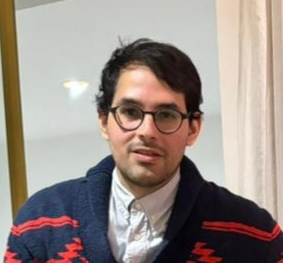
Menu
About Current Projects Group Members Recent Publications Seminars Physics Home
 Numerical simulation of Structure formation with cold dark matter (left) and two-component
flavor-mixed dark matter (right). Simulations were carried out using the Arepo code
at the Advanced Computing Facilities, University of Kansas.
Numerical simulation of Structure formation with cold dark matter (left) and two-component
flavor-mixed dark matter (right). Simulations were carried out using the Arepo code
at the Advanced Computing Facilities, University of Kansas.
About (back to top)
The Center for Relativity and Cosmology at Troy University seeks to answer fundamental
questions about the universe ranging from the nature of the relativistic jets emanating
from supermassive black holes at the center of galaxies to the nature of Dark Matter.
The faculty in the center also explores how quantum matter interacts with gravity,
impacting gravitational collapse and astrophysical objects. We have several ongoing
projects in astrophysics, cosmology, relativity, quantum field theory, differential
geometry and geometric analysis, and have active collaborations with general relativists,
cosmologists, and mathematical physicists.
Current Projects (back to top)
Force-Free Electrodynamics
General Relativistic Magnetohydrodynamics
Large Scale Structure Formation in Flavour-mixed Inelastic Dark Matter
Algebraic Classification of Exact Solutions to the Einstein Field Equations
Quantum Field Theory in Non-smooth Spacetimes

Rakshak Adhikari
Research Interest: General Relativity, Cosmology
URL: https://spectrum.troy.edu/radhikari/

Bruno Arderucio Costa
Research Interest: General Relativity, Quantum Fields in Curved Spacetime, Blackhole
Thermodynamics
URL: https://barderucio.wordpress.com/
Govind Menon
Director, Center for Relativity and Cosmology
Research Interest: General Relativity, Force-Free Electrodynamics, Mathematical Relativity
URL: http://spectrum.troy.edu/gmenon/

Yafet Erasmo Sanchez
Research Interest: General Relativity, Quantum Field Theory in Curved Spacetimes,
Geometric Analysis
Recent Publications (back to top)
- N. A. Alves, A.G.S, Landulfo, and B. Costa, Positive Mass in General Relativity Without Energy Conditions, submitted (2024)
- Y. E. Sanchez, E. Schrohe, The Sobolev Wavefront Set of the Causal Propagator in Finite Regularity, Annales Henri Poincaré (2024)
- R. Adhikari, G. Menon, M. Medvedev, Force-free electromagnetic configurations in FLRW geometry, Phys. Rev. D (2024)
- Y. Sanchez, E. Schrohe, Adiabatic Ground States in Non-smooth Spacetimes,
Annales Henri Poincaré (2024) - B. Costa, Y. Bonder, Signature of Einstein-Cartan theory, Phys. Lett. B (2024)
- R. Adhikari, G. Menon, M. Medvedev, Non-Null and Force-Free Electromagnetic Configurations in Kerr Geometry, Phys. Rev. D (2023)
- S. O'Neil, M. Vogelsberger, S. Heeba, K. Schutz, J. Rose, P. Torrey, J. Borrow, R. Low, R. Adhikari, M. Medvedev, T. Slatyer, J. Zavala, Endothermic self-interacting dark matter in Milky Way-like dark matter haloes, MNRAS (2023)
- Menon, G., The Non-Null and Force-free Electromagnetic Field, Classical and Quantum Gravity, (2021)
Listed below are the Relativity and Cosmology seminars for the 2024-25 academic year. Past talks and physics events can be found by clicking here.
- Plasma behavior in the force-free system
Morifumi Mizuno, University of Arizona, August 29 - The Black Hole Photon Ring
Alex Lupsasca, Vanderbilt University, September 5 - No Black Holes from Light
José Polo-Gómez, University of Waterloo, September 12 - How to learn about fundamental physics from fast rotating neutron
stars: Spectra, Stability and Universal Relations
Christian Krüger, University of Tuebingen, October 3 - Particle motion in a rotating dust spacetime
Davide Astesiano, University of Iceland, October 17 - A Relativistic Quantum Broadcast Channel
André Landulfo, Federal University of ABC, October 24 - Revisiting the enigmatic early universe with T-vacuum state
Sujoy Modak, Cal Poly Pomona, October 31 - Accretion of Dark Matter onto a Moving Schwarzschild Black Hole: An Exact Solution
Patryk Mach, Jagiellonian University, November 7 -
Geodesically Complete Universes
Vania Velluchi, SISSA- International School for Advanced Studies, Nov 21 -
Geodesic causality in Kerr spacetimes
Giulio Sanzeni, Ruhr University Bochum, Jan 23 - Geometrical origin of the Kodama vector
Shunichiro Kinoshita, Nihon University, Feb 20 - A Semiclassical Singularity Theorem
Eleni-Alexandra Kontou, University of York, Mar 6 - Phase Space Mixing of a Vlasov Gas in the Exterior of a Kerr Black Hole
Oliver Sarbach, Michoacana University of San Nicolás de Hidalgo. Mar 27 - Riemannian Flows and Horizon Classification
Ettore Minguzzi, University of Florence, April 23 - Accretion within the innermost stable circular orbit: Analytical thermodynamic solutions
in the adiabatic limit
Andrew Mummery, University of Oxford, TBD
Support Us (back to top)
If you wish to support us, please click here. Funds will be used primarily for travel associated with research collaborations
and presentations of published work, hosting community events to promote interest
in astronomy, astrophysics and cosmology, and to support visiting students, speakers
and scholars.